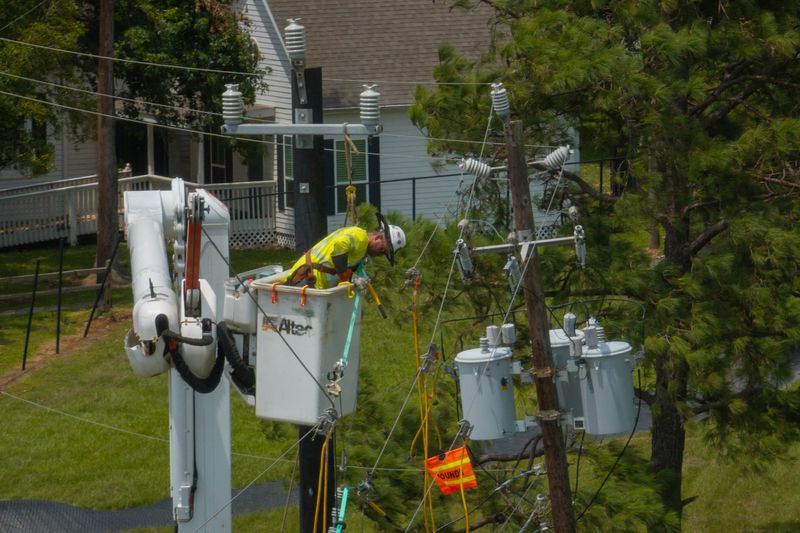
By Arathy Somasekhar
HOUSTON (Reuters) – About a million homes and businesses in Texas remained without power on Friday, five days after Hurricane Beryl made landfall, with fierce winds and rain that knocked down trees and electricity infrastructure.
CenterPoint Energy (NYSE:CNP), the largest power provider in Texas, said about 870,000 of its customers remained affected. It has restored power for about 1.4 million customers in the days since Beryl, according to its website.
Frustrations mounted amongst residents as temperatures in Houston rose and the Heat Index topped 100 degree Fahrenheit (38°C). Some businesses remained closed due to lack of power, while residents were forced to discard hundreds of dollars’ worth of groceries.
“The recent hurricane was only a Category 1. We will likely face more hurricanes, and they could be stronger. Are we going to have the same problems? Will the company in charge of repairing the country be ready this time?” Soonkack Kook, founder of a coffee shop in Midtown Houston, said in an Instagram post.
Meteorologists at Colorado State University this week raised their forecast for the severity of the 2024 hurricanes and called Beryl a harbinger of what could be a very active season. They now anticipate six major storms, categorized by winds over 111 miles per hour, up from an earlier forecast of five.
Beryl was the earliest Category 5 storm on record when it developed over a week ago, but hit the Texas coast as a Category 1 storm with winds around 80 miles per hour.
Kook’s coffee shop has opened a pop-up outside as it has not had power for five days and cannot afford to be closed for that long.
Local residents without power looked for hotels and bookings on vacation rental platforms like Airbnb, but few options were available, many at high price points. Some said they were considering traveling out of town for the weekend, unable to cope with the lack of power and heat.
ENERGY RECOVERY
Beryl made landfall on Monday near Matagorda Bay in South Texas, only about 40 miles (64.37 km) from Freeport, Texas, which houses the country’s third largest liquefied natural gas facility as well as numerous chemical facilities.
Freeport LNG, the third largest liquefied natural gas facility in the U.S., began pulling in small volumes of natural gas for processing on Thursday, according to data from financial firm LSEG. The company has not provided an operational update since Sunday, when it said it ramped down production.
Chemical maker Dow had a process instability due to hurricane Beryl and plant production rates were reduced, the company said in a filing to regulators.
Olin (NYSE:OLN), another chemical company, declared a force majeure on Wednesday for some product and aromatic shipments after Beryl caused damage to its Freeport facilities.
Chemical maker BASF said its facilities in Texas experienced minimal impact from Hurricane Beryl and the site was working to resume normal operations.
Formosa Plastics, which temporarily shut down operations at its Point Comfort plant after a malfunction with a gas compressor system, expects operations to be back to normal by the end of next week as it did not receive any severe damage from Beryl.

Ports along the Gulf Coast, which had closed ahead of the hurricane, largely resumed operations and vessel traffic.
The impact on refineries and offshore production platforms were also limited.
This post is originally published on INVESTING.


